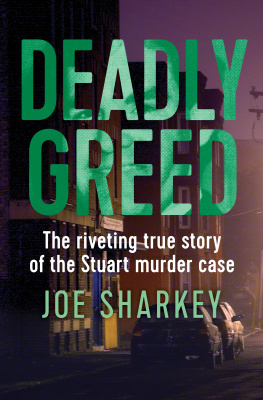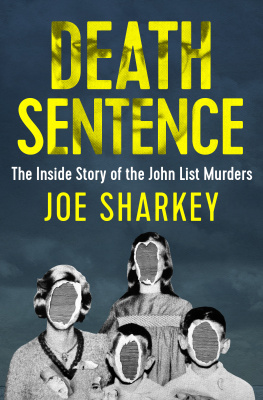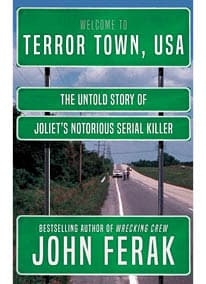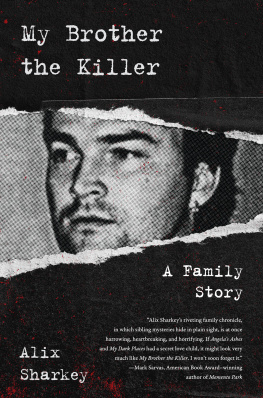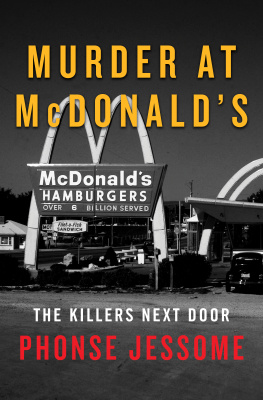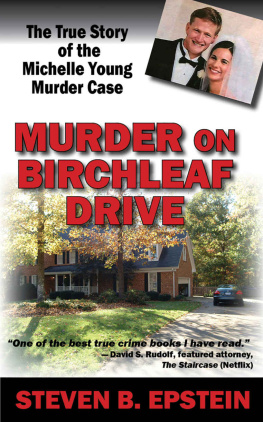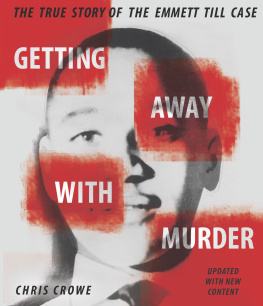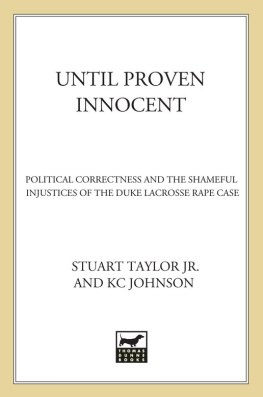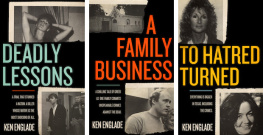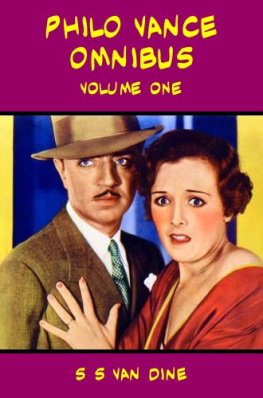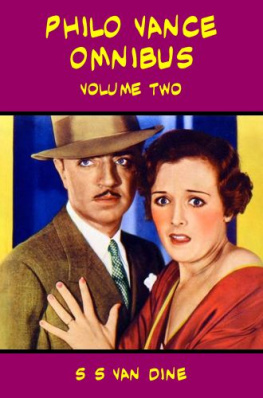Deadly Greed
Joe Sharkey

For Carrie
CONTENTS
ONE
The Hub
The Stuart case should have been a very simple story, as straightforward as yesterdays police log. It occurs often enough that the headline might take only four words:
MAN KILLS WIFE, SELF
For that is what happened, though not in the usual time frame. It was a most basic kind of murder, and when the keepers of crime statistics file it away, it will go under the heading Domestic Violence. Most female homicide victims are killed by their husbands or lovers; violence is a vocational hazard in many domestic relationships. Most of the time, the murderer then kills himself as well. When he does not commit suicide, the killer commonly blames someone else for the crime, often after wounding himself to underscore his innocence.
It should have been no surprise, what actually transpired on that dark, lonely street in Boston on the night of October 23, 1989. A man, of whom the standard psychological profile of the wife abuser fit like the expensive suits he wore, shot his pregnant wife to death, and blamed someone else. Later, when it became clear that the jig, as they used to say in the movies, was up, the murderer jumped off a bridge and killed himself.
Yet it became the biggest news story of the year in Boston, and reverberated for months across the nation. That people like the Stuarts would become victims of random violence reinforced our national fears of urban life, and then came the shock of the terrible hoax.
Some say this story could only have itself played out in Boston. To this day, it is a big city with small-town perspectivesfor better or worse. Everyone has a place; there is a place for everyone. And everyone knows it. A city so full of itself that its headline writers routinely refer to it as the Hub, and have for more than one hundred years, since the poet Oliver Wendell Holmes wrote: All I claim for Boston is that it is the thinking center of the continent, and therefore for the planet the hub of the solar system. It is also a metropolitan area so provincial in outlook that its best-known newspaper, the Globe, could without subsequent embarrassment print this bold headline across its front page on the day after President Kennedy was assassinated in 1963:
John Fitzgerald Kennedy, Born in Brookline, Massachusetts, Shot and Killed in Dallas, Texas, at Age of 46
Twenty-five years later, the state that launched President Kennedy, the only state to vote against Nixon in 1972, was pilloried by George Bush in the 1988 presidential election with his campaigns strikingly effective use of images of Bostons polluted harbor and the states most famous parolee, Willie Horton. Boston is a city many people in America love to loathe. And yet Boston, good and bad, has been an elemental part of our national makeup for three hundred and fifty years.
While there are elements of this story that have a particular local resonance, there are clear echoes in every part of this country. Revere Beach, Massachusetts, could just as well be Asbury Park, New Jersey; Venice Beach, California; Warren, Michigan; Columbus, Georgia; Austin, Texas; Birmingham, Alabama; or any town where people work hard for their share of the American dream.
This is a tragedy that has its roots in what has defined not only Boston but the nation as well: the struggle for turf. But as tragedies must, this has to do first with human beings, three of whom came together one night at the end of the 1980s.
TWO
Chuck
A few minutes before one oclock on a warm afternoon in the final summer of the 1980sand Chuck Stuart, as usual, was a young man in a big hurry. Frowning, he jerked his left forearm front-and-center to consult his gold LaSalle watch, which flashed in the sunlight on Newbury Street as he quickened his pace to make up for the time he had just lost taking a phone call from a wealthy customer who was worried that her fur coat would not be repaired, cleaned, and ready when she came to get it.
That would be sometime in early November, Chuck thought with the sort of annoyance that lately had come to characterize his attitude toward the fur business in general and his career in particular. Though he had earned one hundred and forty thousand dollars the previous year, the climate in the industry had turned decidedly chilly and he was not at all happy. He had just received his annual bonus, and it was considerably less than what he thought it should have been, considering his obvious contributions to the bottom line. Disgusted, Chuck had already decided that he had had it with the fur business and everything associated with it, from the wealthy old fools who had nothing better to do than chart the seasonal migration of their minks from closet to vault and back, to his bosses, two demanding Hungarians who had inherited the fur business from their father and had lately made it clear to their general manager that, as valued an employee as he might be, he was never going to become their equity partner.
Characteristically, Chuck brooded rather than making his discontent clear to his employers, whom he then instinctively blamed for not sensing what he believed should be a patently obvious change in his attitude. To hell with the pelt peddlers, Chuck thought. He had long known he was worth every penny they paid him, and then some, and now he strongly believed that he could do better elsewhere, preferably as his own boss at last. With the fur business on the ropes all over the country, Edward F. Kakas and Sons, Bostons best-known furrier, had nevertheless been holding its ownlargely, he thought, because of his own considerable talents as general manager. Not only could Chuck ably supervise the day-to-day operations of a six-day-a-week business with fifty employees but he could sell, too. Chuck could sell anything: He could sell corkscrews at an. Alcoholics Anonymous meetingthats how good he was. At Kakas, a fair portion of his success came from an ability to sell expensive fur coats to womenusually young women, but sometimes old ones, toowho were not the traditional well-heeled customers of the trade and for whom the purchase of a fur had the fiscal gravity of the purchase of a new car.
Six feet three inches tall, ruggedly handsome, with a twinkle in his eye and a homey Irish charm that he could turn on (and off) in a flash, Chuck conveyed an attractive and, it transpired, lucrative image that amazed and delighted the Kakas brothers, two strikingly blond middle-aged furriers who liked to make magazine ads with their equally blond wives, all of them swathed in full-length minks and sables, usually posed amid the quiet elegance of the landmark Back Bay store which their great-grandfather had founded to cater to the carriage trade that congregated at the tony Ritz-Carlton Hotel a block up Newbury Street at the foot of the Public Garden.
Deep in his brooding, Chuck saw himself as a proud descendant of that retailing line, a master salesman whose skills caused him to be singlehandedly responsible, among other feats, for the anomalous appearance of the occasional mink coat or collar on the streets of such rabbit-pelt strongholds as South Boston and Revere Beach. With its quality antique Persian carpets on marble floors, its hand-carved wood moldings smelling faintly of lemon oil, its ferocious-looking and famous stuffed polar bear on guard with its yellow fangs bared at the foot of its showroom staircase, Kakas Furs appealed to every notion of finery that impelled Chuck in his drive out of Revere. Working there as an executive gave him a sense of pride and, more importantly, of belonging. On more than one occasion, Jay Kakas, the brother who worked most closely with Chuck, was amazed to come into the store unexpectedly before opening time and find Chuck with his sleeves rolled up running an electric buffer across the floor to give it added gloss before the first customer walked in off Newbury Street. The first time this happened, it was immediately clear to Kakas that his young general manager was doing janitorial work not to impress the boss, but rather out of the same remarkable sense of pride that had radiated from him since the first day he walked in looking for a job with the classified ad for management trainee in his hand and a spit-shine on his shoes. From that day, Kakas knew that he had found the kind of worker most employers only dream of: The kid was bright, conscientious, astonishingly detail-oriented, personable, eager to learn, easy to teach, savvyand amazingly aggressive as a salesman.

